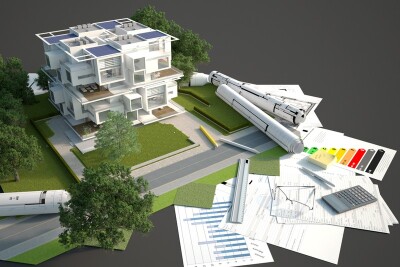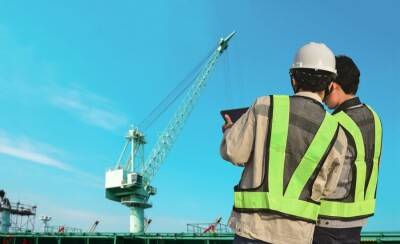Last week, we discussed the worker shortages being felt by the construction industry right now, with the Associated Builders and Contractors estimating that shortages have reached highs of half a million, in part driven by increasing demand for new projects. That said, the technology space is experiencing a purge of talent right now, and this could be the outlet to which construction looks to both fill their workforce needs, and in the process streamline their workflows.
With all of that in mind, we looked last week at five of our 10 emerging roles in the construction industry. Below you can find the full list, as well as in-depth looks at the five which were not covered in part one.
1. Construction Technologist
2. Software Engineer
a. Web/Application Developer
b. Data Engineer
c. Integrations Specialist
3. Cybersecurity Engineer
4. BIM Specialist
5. Geospatial Specialist/Cartographer/LiDAR Specialist
6. Project Coordinator
7. Proposal Specialist
8. Sustainability Engineer
9. Continuous Improvement (CI) Leader
10. Construction Inventory Manager
Project Coordinator
While not a new role per se, a construction project coordinator is an ever-critical role needed to help construction companies better manage workflows, timelines, and budgets as these companies confront staggering labor shortages.
What’s more, as an entry-level administrative role, a project coordinator job may be equally attractive to young people fresh out of college looking for their first role and experienced construction laborers looking to take on a back-office role.
Typical Duties and Responsibilities:
- Assisting project manager in the development of project management documents (e.g., budgets, project schedules, scope statements, and project plans)
- Utilizing project management software (e.g., Procore, Fieldwire, PlanGrid, BuilderTrend, Autodesk Construction Cloud, Oracle Primevera) to streamline project management intake; set deadlines for deliverables; create and upload side-specific documents; and maintain ongoing coordination, communication, and collaboration with project execution teams
- Managing budgets, identifying potential construction overruns, and monitoring project plans
- Preparing estimators’ proposals, RFI, and RFQ requests
- Red-lining drawing and markups and RFIs; building permit tracking systems
- Serving as liaison between project team and clients throughout project lifecycle
- Working with manufacturing (e.g., third-party prefabrication vendors) to resolve scheduling problems and adhere to QA standards
- Managing quality assurance checks and internal audits
- Executing project management administrative and bookkeeping tasks (e.g., managing invoices, purchase orders, inventory reports, and other financial documents)
- Assigning tasks to team members and helping them understand expectations for project milestones and deliverables
- Scheduling stakeholder meetings, documentation, and reports

Average Compensation
A construction project coordinator can expect to earn $65k on average, according to Glassdoor, ranging from $54k on the low end and $80k on the high end.
How to Become One
According to the BLS, a project coordinator typically needs at least a high school diploma, while Indeed recommends postsecondary education such as a diploma or certificate program (e.g., Certified Construction Manager from the Construction Management Association of America or a higher qualification such as a bachelor’s degree). Certainly, experience in the construction industry would be more valuable to a prospective employer than a classroom-heavy degree program with little hands-on experience to speak of.
Proposal Specialist
With access to skilled talent narrower than ever and materials pricing influx, a role that’s more critical now than ever is your company’s proposal specialist. This individual can help tell your company’s story and make you competitive in winning bids while your competitors come up short.
A construction proposal specialist is responsible for reviewing request for proposal (RFP), request for information (RFI), request for quotation (RFQ) and bid/qualification request documents needed to fully understand the client requirements. They use these documents as their source material for crafting a winning bid that earns their construction company the client’s business.
But it sounds much easier than it is. Construction bid writing is a specialized occupation that requires finesse and a crosspollination of art and science to deliver a final proposal that accurately meets RFP requirements while telling a compelling, convincing story that persuades a prospective client why your company should get their business.
Typical Duties and Responsibilities:
- Establishing pre-production document management and file-sharing for proposal teams
- Conducting and participating in proposal kick-off meetings and proposal updates and milestone reviews
- Coordinating content collection with partners and subcontractors as necessary
- Independently reviewing Request for Proposal (RFP) requirements and coordinating professional, thorough proposal
- Assisting in developing content for key sections, including written responses and coordination of appropriate accompanying graphics
- Writing and supplying proposals with "win themes” and competitive advantages
- Interviewing technical and non-technical subject matter experts (SMEs) to gather data and write compelling proposal content while ensuring deliverables are compliant with RFP requirements
- Developing and maintaining templates, style guides, and coordination documents for each proposal in collaboration platforms (e.g., Google Drive, Microsoft SharePoint, Dropbox)
- Conducting post-proposal debriefing and managing libraries for future proposals in various lines of business. Working with company SMEs to ensure libraries are up to date, including recent project experience
Typical Compensation
Compensation varies for this role depending on rank and title.
For example, the generic Proposal Specialist title may command $64k, according to Glassdoor, ranging from 53k on the low end to 79k on the high end. A related title, Bid Writer, makes about the same, though the range starts lower at $51k and tops out higher at $83k. The title Proposal Writer meanwhile, nets a higher average salary of $88k. Moving up the career ladder with titles like Senior Proposal Specialist and Senior Proposal Writer respectively net $90k and $114k.
Moving a step past writing the proposals to coordination/management of the process, salaries for titles like Proposal Coordinator and Proposal Manager respectively earn around $64k and $118k.
How to Become One
A proposal specialist is a writing-heaving role, hence the most common educational qualification that often furnishes job descriptions being a Bachelor’s Degree in English, Journalism, Communication, Professional Writing, Technical Writing/Communication, or a related field (e.g., creative writing, business, marketing).
That said, some universities offer classes with a curated proposal writing experiential curriculum, such this class, ENG 489, offered by Western Illinois University. Its course description reads as follows:
489 Grant and Proposal Writing. (3) Best practices for finding, researching, planning, and writing proposals and grant applications.
For those interested in a proposal/bid writing role, supplementing your coursework with a course like this one, which specifically covers how to find, research for, and write proposal, affords you the unique opportunity to create proposals for real RFPs in a sandbox environment where you can solicit feedback from a seasoned proposal specialist. What’s more, if you’re already working for a construction company looking to enter a proposal specialist role, what better way to provide a proof-of-concept of the value you may bring to the role than sourcing real RFPs through a classroom-moderated environment?
Sustainability Engineer
As the industry looks to deliver on the sustainable construction imperative, sustainable engineers are the subject matter experts needed to enlist to build sustainability architecture and infrastructure; assist with sourcing green building materials; improve industrial processes toward carbon neutrality; etc.
Typical Roles and Responsibilities:
- Designing and constructing solar power installations and maintaining solar energy systems (solar panel engineer)
- Assisting with development and implementation of smart technology (e.g., smart building components, smart HVAC, smart plumbing, etc.)
- Sourcing green building materials from vendors
- Improving industrial processes (prefab) for carbon neutrality and adopting green warehousing processes
- Adopting lean manufacturing processes to remove waste
- Designing water disposal and management systems (civil/environmental engineering)

Typical Compensation
A sustainability engineer can expect to make an average salary of $92k, according to Glassdoor, ranging from $75k on the low end and $117k on the high end.
Similar roles/titles include environmental engineer, earning approximately $80k (from the same source). Meanwhile, a solar engineer earns around $87k.
How to Become One
According to the BLS, a degree in engineering (such as electrical, civil/construction, and environmental engineering) is required by employers to earn entry-level work as an environmental engineer. Similar roles that may provide invaluable experience in the solar industry include Solar Panel Installer and Wind Turbine Technician, which may help you dip your toes into the industry and gain hands-on experience while you work toward your ABET-accredited engineering degree.
Continuous Improvement (CI) Leader
Continuous improvement leaders are professionals that are mission-critical to the efficiency of the manufacturing industry, but they’re equally important to the construction industry as business owners look toward industrialized construction and how they can improve their operations.
Typical Duties and Responsibilities:
- Working with customers and stakeholders in order to analyze company processes and procedures, and to uncover opportunities for developing process enhancement strategies
- Adopting lean management principles to clarify customer value chain while reducing waste
- Adopting offsite construction methods including prefabrication and modular construction to help industrialize processes; streamlining preassembly and sticking to timelines; improving quality assurance and value chain for customers; moving beyond project-based framework toward productization mindset for better outcomes and consistency of quality
- Adopting additive manufacturing techniques, such as 3D printing to increase design freedom and timeliness as well as reduce waste
- Leveraging BIM/VDC modeling and LiDAR to envision finished products in their natural environments for customers, mitigating risk, and exceeding expectations
- Leveraging digital twin technology like IoT, machine learning, and artificial intelligence to improve processes with a true view of the company’s infrastructure and facilitating proactivity via predictive analytics
- Onboarding robotics to streamline procedural tasks and empower team members to be more productive and do their best work
Typical Compensation
According to Glassdoor, a continuous improvement (CI) can expect to make $109k on average, ranging from $88k on the low end and $138k on the high end. Further up the corporate ladder, a Continuous Improvement Manager could expect to make $119k on average ($96k low, $152k high), while a Director of Continuous Improvement could expect to make $168k on average.
How to Become One
Indeed recommends starting with a bachelor’s or master’s in management and administration. Degrees in related areas (such as finance, technology, or engineering) may also be useful. Certification in Value-stream mapping, Lean, 5S, Kanban, and Six Sigma are some of the critical methodologies used in continuous improvement that can prove your competency to a potential employer. What’s more, sharpening your leadership skills in any of your relative career experiences is a crucial first step toward becoming a CI leader.
Construction Inventory Manager
Last but certainly not least, a construction inventory manager (also sometimes called a crib manager) is a critical hire as construction companies look to curb the perfect storm of supply chain challenges, materials price hikes, and labor shortages.
Typical Duties and Responsibilities:
- Managing intake, tagging, kitting, and tracking of construction materials, tools and equipment, and other critical assets via a variety of intersecting technologies such as cloud-based inventory systems and IoT devices and other tracking hardware such as barcodes/readers, Bluetooth tags, RFID, cellular trackers, GPS trackers, etc.
- Improving equipment logistics chain from crib across multiple jobsites to maximize workforce uptime
- Conducting inventory-related construction job costing to better manage equipment rentals, prevent hoarding, and reduce equipment-related overhead
- Procuring safety stock to avoid stockouts
Typical Compensation
Compensation will depend on rank and title.
Meanwhile, more entry-level titles (e.g., Tool Crib Attendant, Inventory Coordinator, and Inventory Specialist) can expect less at around $50k, $53k, $45k, respectively.
Further up the career ladder, a Director of Inventory Manager might earn $122k.
How to Become One
Indeed recommends starting with a bachelor’s degree in inventory management, supply chain management, operations, or business administration. In the construction industry, relevant experience may be more important.
Certification in Production and Inventory Management (CPIM) can help prove your competency to prospective employers, while learning how to use relevant software (e.g., ERP software, warehouse management software, supply chain management software, and other relevant apps and cloud-based productivity platforms) can help you prepare for the job.
Final Word
The industry faces strong headwinds from a workforce shortage perspective. That said, there are emerging roles that can help the industry work more efficiently with fewer resources. What’s more, as these emerging, tech-forward roles grow in prominence, they might attract a younger generation to enter an industry where they can thrive without worrying about the cold, detached, and inhumane slashing of talent perpetrated by bloated tech companies simply looking to appease their shareholders.





_800x374.jpeg.small.400x400.jpg)
